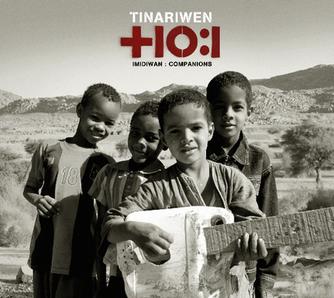Tinariwen and the Conflict in Northern Mali/Azawad
Before they released any albums or gained the international acclaim they currently hold, the founding members of Tinariwen spent several years training in a Libyan military training camp. They then fought in a Touareg rebellion against the governments of Mali and Niger in the Southern Sahara. When that conflict ended in 1994, Tinariwen left behind war to concentrate on music. They have since become the most prominent Touareg/Kel Tamashek musicians in the world. Their latest album, 2011’s Tassili features Tunde Adebimpe and Kyp Malone from TV on the Radio, as well as Nels Cline and The Dirty Dozen Brass Band. It won a Grammy for Best World Music Album. The video from the recording sessions of that album is highly recommended.
More after the jump
Tinariwen’s music has remained strongly political. Though they formed back in the ’80s in Algeria, the group’s base is Tessalit in Northern Mali, the area that is also known as Azawad. Their people, the Touareg, are nomads, who live primarily in the Saharan area of Mali and Niger. The conflict in this area has now lasted half a century, spanning multiple generations of Touareg rebels. The father of Tinariwen’s leader, Ibrahim Ag Alhabib died in the earliest conflict of the early 60s. Tinariwen literally brought the electric guitar to the Sahara. Ibrahim, a fan of Hendrix and Dylan, built his first guitar (much like the one pictured in the album cover for Imidiwan: Companions) at the age of “four or five.” As he puts it: “Before us, the guitar didn’t exist in Touareg music.” The group has to import amps from Europe because it is impossible to find any “within fifteen hundred kilometres” of their home. While they have introduced the guitar to the Sahara, they have also introduced the world to the Desert Blues, a genre invented by the band. The Desert Blues or Assouf contains elements of traditional Touareg music along with an electrified Western influence that combined sounds like an almost trance-like, highly rhythmic version of the blues. Many of Tinariwen’s songs are about the political struggle of the Touareg, which has lately drawn international attention and concern.
The current conflict in Northern Mali/Azawad began this year on January 12 when the MNLA (Movement for the Liberation of Azawad), a Touareg rebel group (pictured above), declared the beginning of an insurrection against the government of Mali. The group declared, “The important military operations of the National Movement for the Liberation of Azawad will continue so long as Bamako does not recognise [sic] this territory as a separate entity.” On April 6, the MNLA went ahead and declared the independence of Azawad from Mali without the recognition of Mali, or, for that matter, that of any other country. Nevertheless, it is clear that the Malian government has lost control of Northern Mali, an area now being fought over by Touaregs and various Islamist groups. Northern Mali/Azawad is also a hotbed for international arms dealers and drug smugglers. Jihadists from Afghanistan and Pakistan have reportedly moved into the area to train militant groups. The situation is so tense in Mali that the interim President, Dioncounda Traore was beaten unconscious by protesters, who may have been allowed into his office by the military. Since June, the MNLA has been engaged in a series of battles with Ansar Dine, an Islamist organization with ties to al Qaeda. Ansar Dine has gained the upper hand in the conflict, and now controls the cities of Northern Mali where it has imposed sharia law. Negotiations have recently begun between Ansar Dine, the MNLA and the Malian government, but the situation remains precarious.
Two days ago, Tinariwen left this status on Facebook: “We are all safe back home in Mali, Assouf Ag Assouf….”Just like the conflict itself, there is no way to exactly predict what Tinariwen will do next. In an interview with Afropop Worldwide, bandmember Abdallah Ag Alhousseini said, “As artists, how we will view [the current conflict], maybe it takes some time. Maybe it will be after a year, maybe more. Because a true artist is never tied to events. Sometimes he sees things 10 years, three years, four years in advance. He sings about an event before the event even happen. Sometimes the events come, but you hear nothing. Because the artist spoke about these events years ago. So we don’t just look at what’s happening today, and sing about that.” Another bandmember, Eyadou Ag Leche told Tamazgha that for their next album, “nous travaillerons dessus dans le désert américain” [We’ll be working in the American desert]. It’s hard to be optimistic about the situation in Northern Mali/Azawad, but the idea of Tinariwen working on a new album somewhere in the American desert that may or may not comment on the war gives hope for exciting new music in our future. Regardless of politics, few groups make music as beautiful and powerful as Tinariwen.


